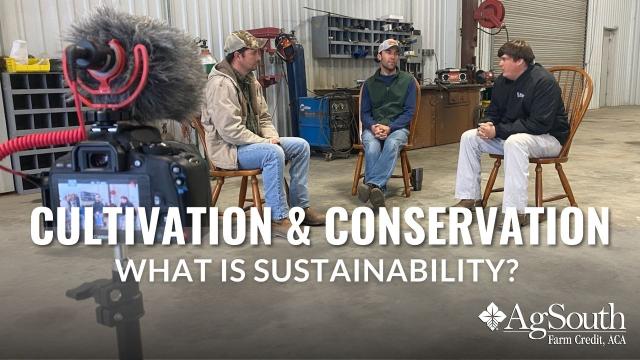Cultivation & Conservation: What Is Sustainability?

Southeast Georgia farmers David Cromley, JD Newton, and Ryne Brannen each farm cotton and peanuts with their families. All in their 30’s, these farmers are driven to grow the highest quality crops they can, in an environmentally conscious way, that is also sustainable for their farm business to pass down to another generation of farmers. Hear their conversation about sustainability - and why it's critically important.
The Real Conversation: What Is Sustainability?
Conservation. Sustainability. Are they just buzzwords, or do they have real meaning to our farmers?
Farmers operate every day with the motto shared by farmer JD Newton, “If we take care of the land, the land will take care of us.” Farming IS sustainable because it’s still here! And farmers – as stewards of the land – are the ultimate conservationists. Farmers are already part of the solution to A. making sure the environment is taken care of, and B. feeding our growing world.
Southeast Georgia Farmers Weigh In
Southeast Georgia farmers David Cromley, JD Newton, and Ryne Brannen each farm cotton and peanuts with their families. All in their 30’s, these young farmers are driven to grow the highest quality crops they can, in an environmentally conscious way, that is also sustainable for their farm business to pass down to another generation of farmers.
What Does "Sustainability" Mean?
For these young row crop farmers, to farm is to look for every opportunity to be sustainable. They see sustainability as meaning a few different things:
Sustainability is taking care of the environment and being good stewards of the earth’s resources.
“As farmers we are stewards of the land, of the water, of the crops that we’re producing, and the nutrients we use to help them grow” says David Cromley.
Sustainability is being able to provide for your people – your employees and their families.
“It is critical for your business to remain sustainable – to take care of your family, and pay your employees enough to take care of their families.” says Ryne Brannen.
Sustainability is being profitable enough to stay in business and continue to farm and grow food.
“From a business standpoint, sustainability is profitability and the ability to stay in business. And being able to pass land down, or a business down, to another generation,” points out JD Newton.
How are Farmers Sustainable?
The three friends could spend hours discussing the different ways they tackle challenges on their farms. And just like in any type of business – they all do things a little differently.
What remains consistent is they care deeply about what they do and how they do it. They are constantly looking to improve and “do better” than what’s been done before.
David shares, “We have to manage our resources because they are finite. We want to keep clean water because we live here. We’re growing a product we would eat ourselves.” And Ryne believes, “If we destroy the environment in which we operate, we destroy ourselves and are not sustainable.”
Although the approaches vary, there are many examples of “sustainable” or “conservation” practices they all implement on their farm:
-
Soil conservation using tillage practices such as using cover crops, strip tillage, and crop rotation. These practices promote soil health, reduce erosion, and reduce pest pressure and thus pesticide applications.
-
Soil nutrient management through soil sampling and applying only the type and amount of fertilizers needed in a specific field.
-
Reduce pesticide use by planting pest resistant crop varieties, which increase beneficial insects in the field that can naturally manage some pest pressure, and using sprayer cut-offs to minimize overlap sprays in a field.
-
Burn less fuel by making less trips across the field – a result of using larger equipment, reduced pesticide applications from planting pest resistant crop varieties, and GPS on tractors.
-
Plant specific crop varieties that are productive in dry and underperforming soil, are storm-tolerant, and grow well in varying soil types.
-
Reduce and manage water application by using soil moisture sensors, low-flow sprinklers, scheduling irrigation based on need.
Are they satisfied they are doing all they can? Not at all! Like all good businessmen, they each are constantly reading, asking questions, looking to researchers for solutions, discussing ideas with each other and trying new technologies and methods of doing things.
You see, farmers want to be part of the solution. They choose - every day - to shoulder the responsibility of feeding the rest of us. They are deeply passionate about the land and taking care of it; after all they are the ultimate stewards of the land.
For all you do – we thank you.
Stay tuned for another segment on Cultivation & Conservation – the Real Conversation.